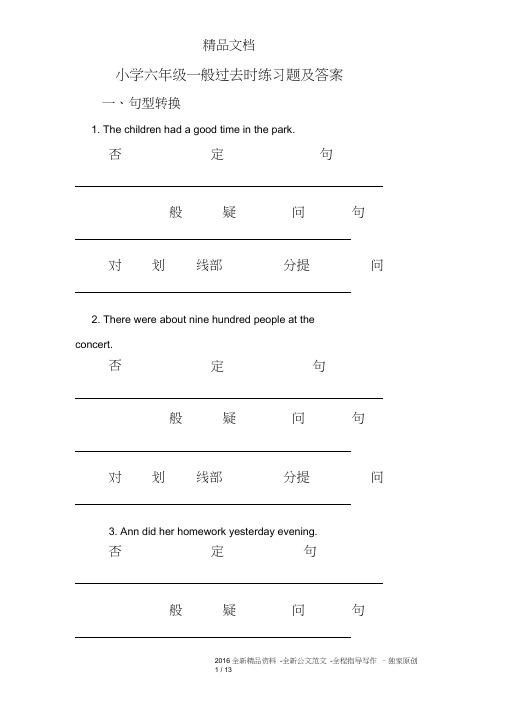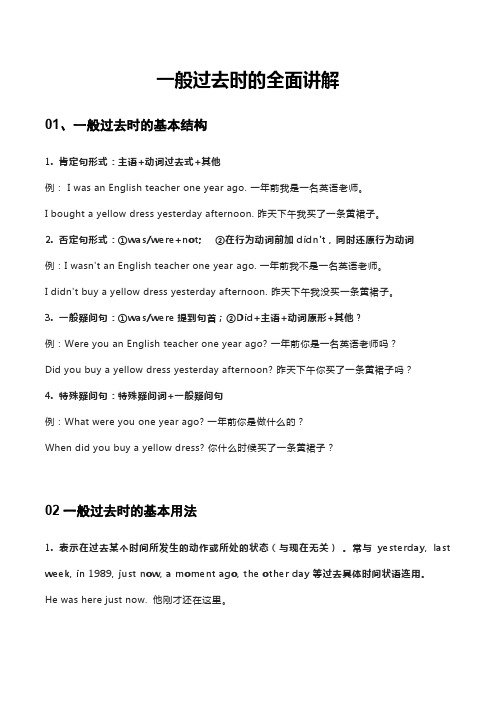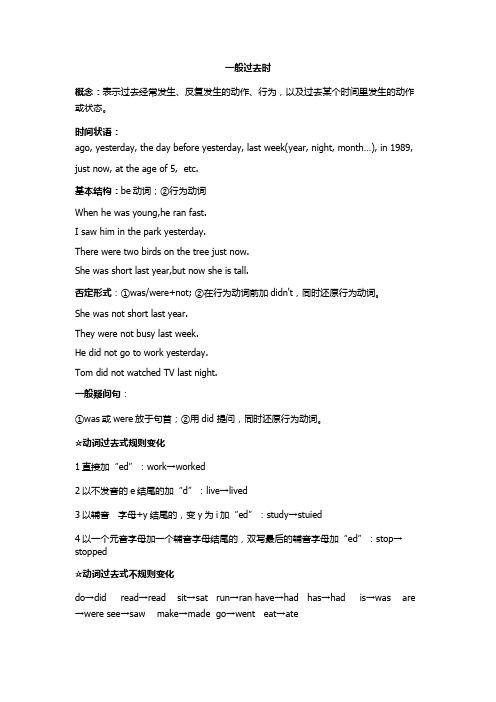小学一般过去式句型转换
小学六年级英语语法四大时态句式转换

四大时态复习1. 一般现在时1一般现在时的构成肯定句☆be动词:主语+beam,is,are+其它;如:I am a boy.我是一个男孩;☆行为动词:主语+行为动词+其它;如:We study English.我们学习英语;☆当主语为第三人称单数he, she,it时,要在动词后加"-s"或"-es";如:Mary likes Chinese. 玛丽喜欢汉语;2一般现在时的变化☆. be动词的变化;否定句:主语+ be + not +其它;如:He is not a worker.他不是工人;一般疑问句:Be +主语+其它; 如:-Are you a student -Yes. I am. / No, I'm not.特殊疑问句:疑问词+一般疑问句;如:Where is my bike☆.行为动词的变化;否定句:主语+ don't doesn't +动词原形+其它;如:I don't like bread.当主语为第三人称单数时,要用doesn't构成否定句;如:He doesn't often play.一般疑问句:Do Does +主语+动词原形+其它;如:- Do you often play football- Yes, I do. / No, I don't.当主语为第三人称单数时,要用does构成一般疑问句;如:- Does she go to work by bike - Yes, she does. / No, she doesn't.特殊疑问句:疑问词+一般疑问句;如:How does your father go to work 动词+s的变化规则1.一般情况下,直接加-s,如:cook-cooks, milk-milks2.以s. x. sh. ch. o结尾,加-es,如:guess-guesses, wash-washes, watch-watches, go-goes 3.以“辅音字母+y”结尾,变y为i, 再加-es,如:study-studies2.现在进行时(1)一般现在时的构成:beam,is, are+ 动词的ing形式;如:I am reading. 我正在读书(2)现在进行时的否定句在be后加not,即beam,is, are + not + 动词的ing形式;如:She is not doing her homework now. 她现在没有做作业;(3)现在进行时的一般疑问句把be动词调到句首,即Beam,is, are + 人+ 动词ing形式;如:Are you drinking milk now 你现在在喝牛奶吗(4)现在进行时的特殊疑问的基本结构为:疑问词+ be + 人+ 动词ing如:Where are you going 你现在去哪但who当主语时其结构为:Who + be + 动词ing如:Who is talking to you 谁在和你说话动词加ing的变化规则1.一般情况下,直接加ing,如:cook-cooking2.以不发音的e结尾,去e加ing,如:make-making, taste-tasting3.如果末尾是一个元音字母和一个辅音字母,双写末尾的辅音字母,再加ing,如:run-running, stop-stopping3.一般将来时1一般将来时基本结构:①be going to + do动词原形;②will+ do动词原形.2否定句:在be动词am, is, are后加not或情态动词will后加not成won’t;结构为:beam, is, are + not + 动词原形will not + 动词原形will not = won’t例如:①I’m going to have a picnic this afternoon.→I’m not going to have a picnic this afternoon.②I will go shopping this weekend.→I will not go shopping this weekend.= I won’t go shopping this weekend.3一般疑问句:be或will提到句首,some改为any, and改为or,第一二人称互换;例如:①We are going to go on an outing this weekend.→Are you going to go on an outing this weekend②I will play football tomorrow afternoon.→Will you play football tomorrow afternoon4特殊疑问句①问人用Who例如:I’m going to New York soon. →Who’s going to New York soon.②问干什么用What …do.例如:My father is going to watch a race with me this afternoon.→What is your father going to do with you this afternoon.③问什么时候用When.例如:She’s going to go to bed at nine. →When is she going to bed4.一般过去时1.肯定句be动词在一般过去时中的变化:☆am 和is在一般过去时中变为was;was not=wasn’t☆are在一般过去时中变为were;were not=weren’t行为动词在一般过去时的句子中要变成过去式一般是在句子后面加ed(2)否定句:be动词变成was notwasn’t 或were not weren’t如:He wasn’t a teacher two years ago.didn’t +动词原形如:Jim didn’t go home yesterday.(3)一般疑问句有be动词的一般疑问句把was或were调到句首;如:Were you a teacher two years ago句中没有be动词的一般过去时的句子,在句首加did,句子中的动词过去式变回原形;如:Did Jim go home yesterday4特殊疑问句:①疑问词+did+主语+动词原形如:What did Jim do yesterday②疑问词是who时:疑问词+动词过去式如:Who went to home yesterday动词过去式变化规则:☆.一般在动词末尾加-ed,如:pull-pulled, cook-cooked☆.结尾是e加d,如:taste-tasted☆.末尾只有一个元音字母和一个辅音字母的重读闭音节,应双写末尾的辅音字母, 再加-ed,如:stop-stopped☆.以“辅音字母+y”结尾的,变y为i, 再加-ed,如:study-studied☆.不规则动词过去式:am,is-was, are-were, do-did, see-saw, say-said, give-gave, get-got, go-went, come-came, have-had, eat-ate, take-took,run-ran, sing-sang, put-put, make-made, read-read, write-wrote, draw-drew, drink-drank, fly-flew, ride-rode,speak-spoke, sweep-swept, swim-swam, sit-sat随堂练习一、写出下列动词的第三人称单数drink ________ go _______ stay ________ make ________ look _________ have_______ pass_______ carry ____ come________ watch______ plant_______ fly ________study_______ brush________ do_________ teach_______二、按照要求改写句子1. Daniel watches TV every evening.改为否定句___________________________________________________2. I do my homework every day.改为一般疑问句,作否定回答________________________________________________________3. She likes milk.改为一般疑问句,作肯定回答___________________________4. I like taking photos in the park.对划线部分提问________________________________________________________5. John comes from Canada.对划线部分提问___________________________________________________三.写出下列动词的现在分词:play________ run__________ swim _________make__________ go_________ like________ write________ _ski___________ read________ have_________ sing ________ dance_________ put_________ see________ buy _________ love____________ live_______ take_________ come ________ get_________ stop_________ sit ________ begin________ shop___________四、句型转换:1. They are doing housework .改成否定句_____________________________________________________________2.The students are cleaning the classroom . 改一般疑问句并作肯定和否定回答__________________________________________________________________________________________________________________________________3.I’m playing the football in the playground .对划线部分进行提问_________________________________________________________________4.Tom is reading books in his study . 对划线部分进行提问_________________________________________________________________五.填空;1. 我打算明天和朋友去野炊;I_____ _______ _________ have a picnic with my friends.I ________ have a picnic with my friends.2. 下个星期一你打算去干嘛我想去打篮球;What ________ ________ _________ _________ _________ next Monday I _______ ______ _____ play basketball.What _________ you do next Monday I ________ play basketball.3. 你妈妈这个周末去购物吗是,她要去买一些水果;_____ your mother _______ ________ go shopping this ___________ Yes, she _________.She ______ ________ __________ buy some fruit.4. 你们打算什么时候见面;What time _______ you _________ __________ meet5. Nancy is going to go camping.改否定Nancy ________ going to go camping.6. I’ll go and join them.改否定I _______ go ______ join them.7. I’m going to get up at 6:30 tomorrow.改一般疑问句________ _______ ________ to get up at 6:30 tomorrow8. We will meet at the bus stop at 10:30.改一般疑问句_______ ________ meet at the bus stop at 10:30.9. She is going to listen to music after school.对划线部分提问________ _______ she ________ ________ _________ after school10. My father and mother are going to see a play the day after tomorrow.对划线部分提问_________ _________ going to see a play the day after tomorrow.七.写出下列动词的过去式fly_______ plant________ are ________ drink_________ play_______ go________make ________ does_________ dance________ worry________ ask _____ taste_________ eat__________ draw________ put ______ throw________ kick_________ pass_______do ________八、句型转换1. It was exciting.否定句:________________________________________________一般疑问句:____________________________________________肯、否定回答:__________________________________________2. All the students were very excited.否定句:________________________________________________一般疑问句:____________________________________________肯、否定回答:__________________________________________3. They were in his pocket.否定句:________________________________________________一般疑问句:____________________________________________肯、否定回答:__________________________________________4. Su Hai took some photos at the Sports day.否定句:________________________________________________一般疑问句:____________________________________________肯、否定回答:__________________________________________5. Nancy went to school early.否定句:________________________________________________一般疑问句:____________________________________________肯、否定回答:__________________________________________6. We sang some English songs.否定句:________________________________________________一般疑问句:____________________________________________肯、否定回答:__________________________________________。
(word完整版)小学六年级一般过去时练习题及答案

jeθX
jseη- <zeuιq□ OJnoXuθq∕√∖- Z
MOU JSnf noX」Oj IIeo OllOIIdo冋eaιoι∣丄-g
XepjθtsθX ψo∕v∖θs noι∣」θqjouu X∣∕∖∣g
jbθXJSeI eseuiqo ILleOl OJUJOIP
ει/9
■ 6uιueθ∣□ UJe o ueθ∣□ gpeueep V XePUnS
ISel
UJOOJ
XUJ
CP!P
OSooP a OP∀ePuθ>∣θθmISel OP科!∣∕∖∣疋Ψ∖ΛZ
6uiujoluXepjθjsθX OSOuJnOuJOS日Mo」」oluoiV
sjθmo∣)θq;pθjθjbmOlIS ' L
XepjθjsθX ψθMθsnoq
I-<i Xepι∣oq」no人UO oB noXθJθq∕√∖-,
t≡⅜≡≡ Al
哥!”tωeMStoιtθqιtpuetθqtθ>∣e∣i0}u∖
tθqitpθdωnf
o”!qtetψedtXqtoV∏uθM-
JSeltpuθ>∣θθMtΛitpiptuqo∏tIPlE ∕w
8
.He wait for you
three
hours
ago.
9
.Who find
it
just
now?
II.
翻
译下列句子
1.我过了一个忙碌但却刺激的周末
精品文档
but exciting weekend.
2.上周六他们做什么了?他们做作业和购物了。
一般过去时的几种句型

一般过去时的几种句型The final revision was on November 23, 2020人称代词用来代替表示人或事物的名词,以便不再重复使用名词。
1)人称代词的主格在句子中作主语用法举例:1.My name is Millie. I live in Beijing. ( I代自己, Millie )2. Sandy, do you know where Mr Wu is ( you代Sandy )3. Simon loves football. He is a member of the football team.4. Millie loves Eddie. She looks after him every day. (she 代 Millie)5. This book is very interesting. It is about cartoons. (it 代this book)6. I am Daniel and this is Amy. We are in Class 1, Grade7. (we 代替 Amy and I)2)人称代词的宾格在句子中作宾语(放在动词后面或者介词后面)me the answer, please.(动词后面)’s go.(=let us go) (动词后面)3. Look at him. He is funny! (介词后面)物主代词的定义:物主代词实际上是人称代词的所有格形式。
物主代词可以分为形容词性和名词性两种。
形容词性物主代词一定要后接名词(如:This is my book. 这是我的书。
),名词性物主代词可以独立使用,无需后接名词(如:This book is mine. 这本书是我的。
)。
3) 形容词性物主代词一般位于名词前,用作定语,限定该名词的意义This is my book.4) 名词性物主代词的句法功能a. 作主语,例如:May I use your pen Mine is broken.(mine=my pen)我可以用一用你的钢笔吗我的坏了。
超详细一般过去时的全面讲解【附练习与答案】

一般过去时的全面讲解01、一般过去时的基本结构1. 肯定句形式:主语+动词过去式+其他例: I was an English teacher one year ago. 一年前我是一名英语老师。
I bought a yellow dress yesterday afternoon. 昨天下午我买了一条黄裙子。
2. 否定句形式:①was/were+not; ②在行为动词前加didn't,同时还原行为动词例:I wasn't an English teacher one year ago. 一年前我不是一名英语老师。
I didn't buy a yellow dress yesterday afternoon. 昨天下午我没买一条黄裙子。
3. 一般疑问句:①was/were提到句首;②Did+主语+动词原形+其他?例:Were you an English teacher one year ago? 一年前你是一名英语老师吗?Did you buy a yellow dress yesterday afternoon? 昨天下午你买了一条黄裙子吗?4. 特殊疑问句:特殊疑问词+一般疑问句例:What were you one year ago? 一年前你是做什么的?When did you buy a yellow dress? 你什么时候买了一条黄裙子?02一般过去时的基本用法1. 表示在过去某个时间所发生的动作或所处的状态(与现在无关)。
常与yesterday, last week, in 1989, just now, a moment ago, the other day等过去具体时间状语连用。
He was here just now. 他刚才还在这里。
What did you do yesterday? 你昨天做了什么事?2. 在过去一段时间内的经常性或习惯性动作。
六年级英语一般过去时讲解与练习

六年级(Ji)英语一般过去时讲解与练习1.一般过去时表示过去某个时间发生的动作或存在的状态,常和表示过去的时间状语连用。
一般过去时也表示过去经常或反(Fan)复发生的动作。
2.Be动词在一般过去时(Shi)中的变化:⑴am 和is在一般(Ban)过去时中变为was。
(was not=wasn’t)⑵are在一般过(Guo)去时中变为were。
(were not=weren’t)⑶带有was或were的句(Ju)子,其否定、疑问的变化和is, am, are一样(Yang),即否定句在was或were后加not,一般疑问句把was或were调到句首。
3.句中没(Mei)有be动词的一般过去时的句子否定句:didn’t +动词原形,如:Jim didn’t go home yesterday. 一般疑问句:在句首加did,句子中的动词过去式变回原形。
如:Did Jim go home yesterday?特殊疑问句:⑴疑问词+did+主语+动词原形?如:What did Jim do yesterday? ⑵疑问词当主语时:疑问词+动词过去式?如:Who went to home yesterday? 动词过去式变化规则:1.一般在动词末尾加-ed,如:play-played, cook-cooked2.结尾是e加d,如:taste-tasted3.末尾只有一个元音字母和一个辅音字母的重读闭音节,应双写末尾的辅音字母,再加-ed,如:stop-stopped4.以“辅音字母+y”结尾的,变y为i,再加-ed,如:study-studied 5.小学常用不规则动词过去式:am,is-was, are-were, do-did, see-saw, say-said, give-gave, get-got, go-went, have-had, eat-ate, take-took, run-ran, sing-sang, put-put, make-made, read-read, write-wrote, draw-drew, drink-drank, fly-flew, ride-rode, speak-spoke, sweep-swept, swim-swam, sit-sat一.用be动词的适当形式填空1. We __________ students five years ago.2. Patti and I __________ good friends.3. Today __________ Tuesday, Yesterday __________ Monday.4. Sue __________ on the slide a moment ago.5. Where is my hat? It _______ on the desk just now.二.单项选择:从下列各题后所给的四个选项中选择最佳答案填空。
小学英语语法一般过去时总结及练习

一般过去时概念:表示过去经常发生、反复发生的动作、行为,以及过去某个时间里发生的动作或状态。
时间状语:ago, yesterday, the day before yesterday, last week(year, night, month…), in 1989, just now, at the age of 5, etc.基本结构:be动词;②行为动词When he was young,he ran fast.I saw him in the park yesterday.There were two birds on the tree just now.She was short last year,but now she is tall.否定形式:①was/were+not; ②在行为动词前加didn't,同时还原行为动词。
She was not short last year.They were not busy last week.He did not go to work yesterday.Tom did not watched TV last night.一般疑问句:①was或were放于句首;②用did 提问,同时还原行为动词。
☆动词过去式规则变化1直接加“ed”:work→worked2以不发音的e结尾的加“d”:live→lived3以辅音字母+y结尾的,变y为i加“ed”:study→stuied4以一个元音字母加一个辅音字母结尾的,双写最后的辅音字母加“ed”:stop→stopped☆动词过去式不规则变化do→did read→read sit→sat run→ran have→had has→had is→was are →were see→saw make→made go→went eat→ate一般过去时的练习一、用所给的动词的适当形式填空。
⒈He ___________(visit) the Great Wall last year.2.We____________(have) a good time yesterday.3.We often __________(go) to school by bus last year.4.I __________(live)in the village when I was a child.5.Mike__________(see) a big tiger in the nature park last year.6.Sam___________ (do) the housework yesterday.7.________(do) you _________(enjoy) yourself yesterday?8.________(do)you __________(play) the violin in the artroom yesterday?9.I __________ (eat) a big pizza yesterday.10.There_________ (be) many sheep on the farm last year.11. I _________ (watch) a cartoon on Saturday.12. Her father __________ (read) a newspaper last night.13. We _________ to zoo yesterday, we ___________ to the park. (go)14. _________ you __________ (visit) your relatives last Spring Festival?15. _________ he __________ (fly) a kite on Sunday? Yes, he __________.二、单项选择( ) 1. She watered the flowers ________.A tomorrowB sometimesC yesterday morning( ) 2.What ____ Mike do last weekend ?A doB doesC did( ) 3. I ___ my room last Sunday.A cleanedB cleanC am cleaning( ) 4. _____ you _____ TV last night .A Do, watchB Did, watchC Did, watched( ) 5.---Did your father write an e-mail yesterday ?A Yes, he did.B Yes, he doesC No, he don’t( ) 6.They _____ on a trip in February ,2007.A are goingB goingC went( ) 7. ____ he ____ football two days ago?A Does , playB Did , playedC Did , play三、Be动词的过去时练习(一)用be动词的适当形式填空。
小学六年级英语语法四大时态句式转换
四大时态复习1. 一般现在时(1)一般现在时的构成(肯定句)☆be动词:主语+be(am,is,are)+其它。
如:I am a boy.我是一个男孩。
☆行为动词:主语+行为动词(+其它)。
如:We study English.我们学习英语。
☆当主语为第三人称单数(he, she,it)时,要在动词后加"-s"或"-es"。
如:Mary likes Chinese. 玛丽喜欢汉语。
(2)一般现在时的变化☆. be动词的变化。
[否定句]:主语+ be + not +其它。
如:He is not a worker.他不是工人。
[一般疑问句]:Be +主语+其它。
如:-Are you a student? -Yes. I am. / No, I'm not.[特殊疑问句]:疑问词+一般疑问句。
如:Where is my bike?☆.行为动词的变化。
[否定句]:主语+ don't( doesn't ) +动词原形(+其它)。
如:I don't like bread.当主语为第三人称单数时,要用doesn't构成否定句。
如:He doesn't often play.[一般疑问句]:Do( Does ) +主语+动词原形+其它。
如:- Do you often play football?- Yes, I do. / No, I don't.当主语为第三人称单数时,要用does构成一般疑问句。
如:- Does she go to work by bike? - Yes, she does. / No, she doesn't.[特殊疑问句]:疑问词+一般疑问句。
如:How does your father go to work?*动词+s的变化规则1.一般情况下,直接加-s,如:cook-cooks, milk-milks2.以s. x. sh. ch. o结尾,加-es,如:guess-guesses, wash-washes, watch-watches, go-goes 3.以“辅音字母+y”结尾,变y为i, 再加-es,如:study-studies2.现在进行时(1)一般现在时的构成:be(am,is, are)+ 动词的ing形式。
一般过去时 六年级英语知识点
一般过去时(小学)一、定义1.表示过去某个时间发生的动作或存在的状态。
如:She ate three apples yesterday. 昨天她吃了三个苹果。
I got up at 6:30 yesterday. 我昨天6:30起床。
My father was very busy last week.我父亲上周很忙。
2.表示过去经常或过去反复发生的动作(也可与often,always等频率副词连用)。
如:He always got up very early when he was young.年轻的时候,他每天总是起得很早。
二、谓语形式:动词的过去式(1)She was a student two years ago. 两年前她是一个学生。
(这件事情已经过去了,所以be动词is要用过去式was)(2)they were students two years ago. 两年前他们/她们是学生。
(这件事情已经过去了,所以be动词are要用过去式were)(3) Ann washed her clothes last night. 安昨晚洗了她的衣服。
(这件事情已经过去了,所以动词wash要用过去式washed)(4) I did my homework promptly. 我及时地完成了作业。
(这件事情已经过去了,所以动词do要用过去式did)三、句子结构:(a) be 动词的过去式句型: (b)动词过去式句型:(a) be 动词的过去式句型:1.肯定句:主语+be 动词(was , were)+其他,如:She was a student two years ago. 两年前她是一个学生。
2.否定句:主语+be not(was not, were not)+其他,如:She was not a student two years ago. 两年前她不是一个学生。
3.一般疑问句:Be动词(Was/Were)+主语+其他?肯定回答为“Yes,主语+was/were”,否定回答为“No,主语+wasn’t/weren’t”。
完整版)一般过去时句型转换专练
完整版)一般过去时句型转换专练否定句:The car was not in front of the house just now.一般疑问句:Was the car in front of the house just now?肯、否定回答:Yes。
it was。
/ No。
it wasn't.划线提问:Where was the car just now?5.The students were very happy.否定句:The students were not very happy.一般疑问句:Were the students very happy?肯、否定回答:Yes。
the students were very happy。
/ No。
the students were not very happy.划线提问:What were the students like?6.They were in his pocket.否定句:They were not in his pocket.一般疑问句:___ pocket?肯、否定回答:Yes。
they were in his pocket。
/ No。
they were not in his pocket.划线提问:Where were they?7.___.否定句:They did not play football in the playground.一般疑问句:Did they play football in the playground?肯、否定回答:Yes。
___。
/ No。
they did not play football in the playground.划线提问:What did they do in the playground?8.He went out ten minutes ago.否定句:He did not go out ten minutes ago.一般疑问句:Did he go out ten minutes ago?肯、否定回答:Yes。
一般现在时和一般过去时的句型转换
一般现在时和一般过去时的句型转换1. 生活中的小故事生活中,我们常常需要用不同的时态来表达事情,今天就聊聊一般现在时和一般过去时的那些事儿。
就比如说,你每天早上都喝咖啡,对吧?你可以说:“我每天都喝咖啡。
”这是一般现在时,简单明了。
可是,回想一下,上个月的那个星期六,你去咖啡店时,可能会说:“我那天喝了咖啡。
”这就变成了一般过去时。
看到没,这种转换就像魔术一样,轻而易举!1.1. 早晨的咖啡时光想象一下,一个阳光明媚的早晨,你懒洋洋地躺在床上,心里想着:“我总是喜欢在早晨喝一杯热腾腾的咖啡。
”这是一种习惯,反映了你的一般现在时。
可是一转眼,时光倒流,回到上个月,那时候你可真是被咖啡圈了个彻底:“上个月我在新开的咖啡店喝了一杯超好喝的拿铁。
”说到那杯拿铁,真的是香气四溢,瞬间把我拉回到那个瞬间。
想想现在的自己,一杯咖啡在手,简直是人生的赢家,哈哈!1.2. 每天的跑步计划再说说运动,哦,运动这事儿。
你可能会说:“我每天早上都去跑步。
”这是个健康的习惯啊,大家都应该学学!可是回想一下,上个星期日,你就得改口:“我上个星期日去跑了十公里!”这时候的你,脸上肯定挂着得意的笑容,仿佛刚刚完成了一项伟大的壮举,心里想着:“我真是太棒了!”一想到这些,立刻充满了动力,想要继续努力!2. 生活中的变化生活中,总是充满了变化。
现在的你也许正在学习新东西:“我现在正在学吉他。
”可是,想想去年,你可能会说:“去年我学了一整年的吉他。
”这种时态的变化就像一个时间的漩涡,把你带回到过去,又拉回现在。
这种对比,真是让人感慨万千。
2.1. 学习的乐趣想想现在,可能你在乐队里练习:“我现在和我的朋友们一起排练。
”可是,上个学期,你可得说:“上个学期我们常常一起排练。
”那种团结的气氛,真是让人怀念。
一起挥洒汗水,一起欢笑,生活中能有这样的伙伴,真是太幸福了。
学吉他不仅仅是技术上的提升,更是和朋友们一起享受音乐的乐趣!2.2. 饮食的变化再说到饮食习惯。
- 1、下载文档前请自行甄别文档内容的完整性,平台不提供额外的编辑、内容补充、找答案等附加服务。
- 2、"仅部分预览"的文档,不可在线预览部分如存在完整性等问题,可反馈申请退款(可完整预览的文档不适用该条件!)。
- 3、如文档侵犯您的权益,请联系客服反馈,我们会尽快为您处理(人工客服工作时间:9:00-18:30)。
一般过去时详细讲解与练习题 一、巧记一般过去时: 动词一般过去时,表示过去发生的事;be用was或用were, have,has变had; 谓语动词过去式,过去时间作标志;一般动词加-ed,若是特殊得硬记。 否定句很简单,主语之后didn’t添; 疑问句也不难,did放在主语前; 不含be动词时 如果谓语之前有did,谓语动词需还原; 动词若是was,were,否定就把not添。 含be动词时 疑问句也不难,要把was,were放在主语前。 二、be的一般过去时:学习动词be的一般过去时,下面有一口诀,它可以帮你们更好地掌握动词be的一般过去时。 be的过去时有四巧: 一是时间状语巧, 表示过去的短语要记牢; 二是形式巧,单数was,复数were; 三巧是否定句结构,not紧跟was/were; 四是疑问句式巧,was/were向前跑(提前)。 【一巧】时间状语(即标志词)巧。一般过去时表示过去发生的动作或存在的状态,恰巧与表示过去的一些时间状语连用。 【二巧】形式巧。它与一般现在时一样,形式多样:当主语是第一人称单数或第三人称单数时,谓语动词用was;主语是第二人称或其他人称复数时,谓语动词用were。 eg: I was in the classroom yesterday morning. 昨天早上我在教室里。 He was at school last Tuesday. 上周二他在学校。 They were over there a moment ago. 刚才他们在那边。 【三巧】否定句结构巧。与动词be的一般现在时一样,它在动词后面加not即可变成否定句,并且was, were与not可以缩写成wasn't, weren't。即: 主语 + wasn't/ weren't + 表语 + 其他。 例如:I was not (=wasn't) here yesterday. 昨天我不在这儿。 My parents were not (=weren't) at home last Sunday. 上周日我父母不在家。 【四巧】 疑问句式巧。把was, were提到句首,句末用问号即可变为一般疑问句。即:Was(Were) + 主语 +表语 + 其他?这恰巧与动词be的一般现在时的疑问句式相似。 例如:Were you at home the day before yesterday﹖ 前天你在家吗? Was she late this morning﹖今天早上她迟到了吗? 更巧的是疑问句的答语也相似,肯定回答用“Yes, 主语+was/were.”; 否定回答用“No,主语+wasn't/weren't.”。 eg:—Were Wei Hua and Han Mei here just now﹖ 刚才魏华和韩梅在这儿吗? —Yes, they were. (No, they weren't.) 是的,她们在。(不,她们不在。)动词过去式变化规则: 1.一般在动词末尾加-ed,如:pull-pulled, cook-cooked 2.结尾是e加d,如:taste-tasted 3.末尾只有一个元音字母和一个辅音字母的重读闭音节,应双写末尾的辅音字母,再加-ed,如:stop-stopped 4.以“辅音字母+y”结尾的,变y为i, 再加-ed,如:study-studied 5.不规则动词过去式: am,is-was are-were do-did see-saw say-said give-gave get-got go-went come-came have-had eat-ate take-took run-ran sing-sang put-put make-made read-read write-wrote draw-drew drink-drank fly-flew ride-rode speak-spoke sweep-swept swim-swam sit-sat 一、 句型转换 1. The children had a good time in the park. 否定句: __________________________________________ 一般疑问句: __________________________________________ 对划线部分提问:__________________________________________ 2. There were about nine hundred people at the concert.(音乐会) 否定句: __________________________________________ 一般疑问句: __________________________________________ 对划线部分提问:__________________________________________ 3. Ann did her homework yesterday evening. 否定句: __________________________________________ 一般疑问句: __________________________________________ 对划线部分提问:__________________________________________ 4. Last week I read an English book. 否定句: __________________________________________ 一般疑问句: ___________________________________________ 肯定/否定回答: __________________________________________ 对划线部分提问:__________________________________________ 5. My brother was in the park just now. 否定句: __________________________________________ 一般疑问句: __________________________________________ 肯定/否定回答:___________________________________________ 对划线部分提问:____________________________________ 6. She had some bread for lunch yesterday. 否定句:__________________________________________ 一般疑问句:________________________________________ 肯定/否定回答:____________________________________ 对划线部分提问:____________________________________ *7. They read English last night. 否定句:__________________________________________ 一般疑问句:________________________________________ 肯定/否定回答:____________________________________ 对划线部分提问:____________________________________ 8. I was born in 2007. 否定句:_____________________________________________ 一般疑问句:_________________________________________ 对划线部分提问:_____________________________________ 二、写出下列动词的过去式 Is_______ are ________have _________want _______hear________ Sit_______ watch _______play ______ enjoy _______do________ study ______ dance _______like_______ live ________go ______ buy ______ eat______ get _______ walk ______take______ put _______run______ come_______ become________ fly________ swim_______ find _______ begin______ 三、请用正确动词形式填空。 1. I _________ (have) an exciting party last weekend. 2. _________ she _________(practice) her guitar yesterday? No, she _________. 3. What ________ Tom ________ (do) on Saturday evening? He ________(watch) TV and __________(read) an interesting book. 4. They all _________(go) to the mountains yesterday morning.
